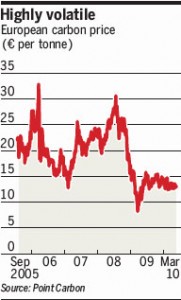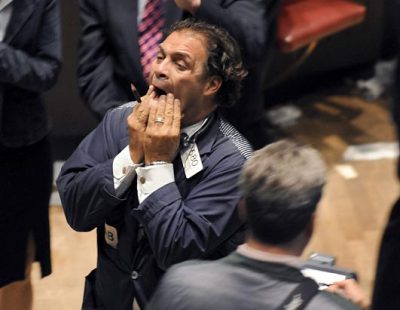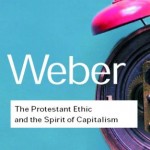 No, this isn’t a post about the goodies at this-coming Monday’s Econ TeaBA (where, rumor has it, Professor Galambos will explain the competitive market model to Professor Corry in 15 minutes. Whether he can make good on this promise remains to be seen. In either case, please, no wagering at the TeaBA).
No, this isn’t a post about the goodies at this-coming Monday’s Econ TeaBA (where, rumor has it, Professor Galambos will explain the competitive market model to Professor Corry in 15 minutes. Whether he can make good on this promise remains to be seen. In either case, please, no wagering at the TeaBA).
This is a post about who will benefit and who will lose from the climate legislation. We have been talking about the distributional issues in Economics 280 for a couple of weeks, that there are many ways to get the same “quantity,” but who wins and who loses can vary radically. The projected shares are a big key to determining political feasibility — businesses like free permits much more than auctioned permits, and certainly much more than (egads) paying a tax. On this front, we will be reading a paper called “Carbon Geography: The Political Economy of Congressional Support for Legislation Intended to Mitigate Greenhouse Gas Production” in our political economy course next week. The basic idea here is that representatives from states with high per-capita carbon emissions are less likely to support costly carbon restrictions. (Actually, I haven’t read the paper yet, but I would have bet a dollar that’s what it says. That is, I would bet a if I hadn’t discouraged wagering in the previous paragraph).
As for the distribution front, Ted Gayer from Brookings has some preliminary estimates on who is going to capture the value of freely-allocated and auctioned permits over the first 20 years of the program. The program will start with about 75% of the permits being handed out and more than half of the value of those permits accruing to electric utilities. Less than 10% of the revenue will flow to deficit reduction or to offset other taxes. Between 2026 and 2027, however, the percentage of auctioned permits jumps and ascends from 20% to a full 100%. And, if you believe that is a credible commitment, I would encourage you to sleep it off and rethink your position tomorrow. Consumer relief — that is, higher prices reduce consumer benefits — stays steady about 10% throughout. Believe him or not, Gayer’s short brief is worth reading precisely because he hits the heart of the environmental policy debate.
 Just don’t try to sell the kits at Walgreens.
Just don’t try to sell the kits at Walgreens. On the other side of the pond, there actually is a cap & trade system in place, and it is really all over the price. Carbon prices have ranged from €8 to €30, and the volatility can stymie long-term investments. In other words, there is likely to be an inverse relationship between carbon prices and the payoff to greener (or at least lower-carbon) energy sources. If investors don’t believe that carbon prices will be high, then green investments simply won’t be as attractive.
On the other side of the pond, there actually is a cap & trade system in place, and it is really all over the price. Carbon prices have ranged from €8 to €30, and the volatility can stymie long-term investments. In other words, there is likely to be an inverse relationship between carbon prices and the payoff to greener (or at least lower-carbon) energy sources. If investors don’t believe that carbon prices will be high, then green investments simply won’t be as attractive. There seems to be some difference in the moment-to-moment intensity of an auction theory class and that of an actual auction. Especially when the S&P is amidst an epic tank.
There seems to be some difference in the moment-to-moment intensity of an auction theory class and that of an actual auction. Especially when the S&P is amidst an epic tank. A few weeks ago, despite its substantial girth, I added the new Kaufmann Foundation volume, Invention of Enterprise: Entrepreneurship from Ancient Mesopotamia to Modern Times to the black hole that is my reading list. The reason for my excitement was the extra-ordinary group of volume editors. David Landes is a pioneer in entrepreneurship and development, having written the highly-regarded
A few weeks ago, despite its substantial girth, I added the new Kaufmann Foundation volume, Invention of Enterprise: Entrepreneurship from Ancient Mesopotamia to Modern Times to the black hole that is my reading list. The reason for my excitement was the extra-ordinary group of volume editors. David Landes is a pioneer in entrepreneurship and development, having written the highly-regarded  Many theories, most famously Max Weber’s essay on the ‘Protestant ethic,’ have hypothesized that Protestantism should have favored economic development. With their considerable religious heterogeneity and stability of denominational affiliations until the 19th century, the German Lands of the Holy Roman Empire present an ideal testing ground for this hypothesis. Using population figures in a dataset comprising 276 cities in the years 1300-1900, I find no effects of Protestantism on economic growth. The finding is robust to the inclusion of a variety of controls, and does not appear to depend on data selection or small sample size. In addition, Protestantism has no effect when interacted with other likely determinants of economic development. I also analyze the endogeneity of religious choice; instrumental variables estimates of the effects of Protestantism are similar to the OLS results.
Many theories, most famously Max Weber’s essay on the ‘Protestant ethic,’ have hypothesized that Protestantism should have favored economic development. With their considerable religious heterogeneity and stability of denominational affiliations until the 19th century, the German Lands of the Holy Roman Empire present an ideal testing ground for this hypothesis. Using population figures in a dataset comprising 276 cities in the years 1300-1900, I find no effects of Protestantism on economic growth. The finding is robust to the inclusion of a variety of controls, and does not appear to depend on data selection or small sample size. In addition, Protestantism has no effect when interacted with other likely determinants of economic development. I also analyze the endogeneity of religious choice; instrumental variables estimates of the effects of Protestantism are similar to the OLS results. That’s the answer. The question is from
That’s the answer. The question is from  So that gets us back to the original question, which is, should we think about the regulatory framework for the current oil spill fiasco in terms of regulating some sort of risk or internalizing an externality? And, does it make a difference which approach we take in terms of the types of regulations we would want?
So that gets us back to the original question, which is, should we think about the regulatory framework for the current oil spill fiasco in terms of regulating some sort of risk or internalizing an externality? And, does it make a difference which approach we take in terms of the types of regulations we would want?





 Several blogs that I read have pointed to Russ Roberts’ new essay on the financial crisis,
Several blogs that I read have pointed to Russ Roberts’ new essay on the financial crisis,  Well, the Department of Interior finally
Well, the Department of Interior finally